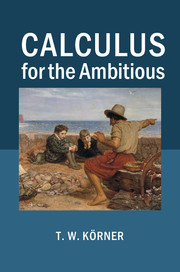Book contents
- Frontmatter
- Epigraph
- Contents
- Introduction
- 1 Preliminary ideas
- 2 The integral
- 3 Functions, old and new
- 4 Falling bodies
- 5 Compound interest and horse kicks
- 6 Taylor's theorem
- 7 Approximations, good and bad
- 8 Hills and dales
- 9 Differential equations via computers
- 10 Paradise lost
- 11 Paradise regained
- Further reading
- Index
4 - Falling bodies
Published online by Cambridge University Press: 05 June 2014
- Frontmatter
- Epigraph
- Contents
- Introduction
- 1 Preliminary ideas
- 2 The integral
- 3 Functions, old and new
- 4 Falling bodies
- 5 Compound interest and horse kicks
- 6 Taylor's theorem
- 7 Approximations, good and bad
- 8 Hills and dales
- 9 Differential equations via computers
- 10 Paradise lost
- 11 Paradise regained
- Further reading
- Index
Summary
Galileo
At the age of 69, Galileo was forced into a humiliating public denial of the Copernican ideas that he had done so much to defend. ‘Vehemently suspect of heresy’, he was placed under house arrest for the rest of his life. Fearing that his ideas and discoveries would die with him, Galileo decided to write an account of his earlier researches.
The resulting book, published in Holland outside the reach of the Roman Inquisition, was entitled Discourses and Mathematical Demonstrations Relating to Two New Sciences and was one of the most influential books ever written. The first new science was what we would now call material science and the second was what we now call dynamics.
My purpose is to set forth a very new science dealing with a very ancient subject. There is, in nature, perhaps nothing older than motion, concerning which the books written by philosophers are neither few nor small; nevertheless I have discovered by experiment some properties of it which are worth knowing and which have not hitherto been either observed or demonstrated. Some superficial observations have been made, as, for instance, that the free motion of a heavy falling body is continuously accelerated; but to just what extent this acceleration occurs has not yet been announced; for so far as I know, no one has yet pointed out that the distances traversed, during equal intervals of time, by a body falling from rest, stand to one another in the same ratio as the odd numbers beginning with unity.
It has been observed that missiles and projectiles describe a curved path of some sort; however, no one has pointed out the fact that this path is a parabola. But this and other facts, not few in number or less worth knowing, I have succeeded in proving; and what I consider more important, there have been opened up to this vast and most excellent science, of which my work is merely the beginning, ways and means by which other minds more acute than mine will explore its remote corners.
Discourses Relating to Two New Sciences- Type
- Chapter
- Information
- Calculus for the Ambitious , pp. 71 - 83Publisher: Cambridge University PressPrint publication year: 2014



